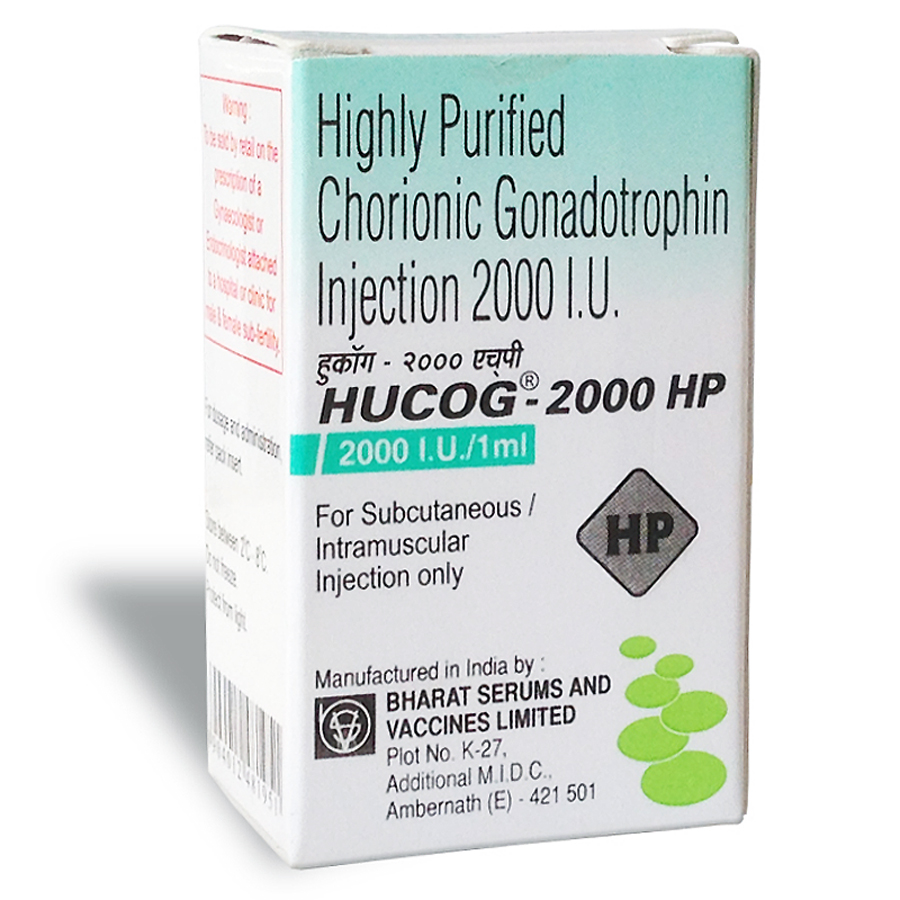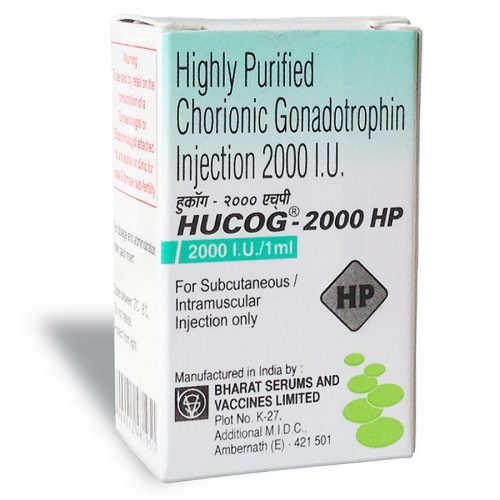Description
Chorionic Gonadotrophin Injection
Human chorionic gonadotropin (hCG) is a hormone produced by the placenta after implantation. The presence of HUCOG 2000 is detected in some pregnancy tests (HCG pregnancy strip tests). Some cancerous tumours produce this hormone; therefore, elevated levels of measured hCG when the patient is not pregnant, can lead to a cancer diagnosis and, if high enough, paraneoplastic syndromes. However, it is not known whether this production is a contributing cause or an effect of carcinogenesis. The pituitary analogue of hCG, known as Luteinizing hormone (LH), is produced in the pituitary gland of males and females of all ages.
HUCOG 2000 I.U
Human chorionic gonadotropin (HUCOG 2000) is a hormone that protects the ordinary development of an egg within a lady’s ovaries, and stimulates the arrival of the egg during the ovulation process.
HCG is utilized to stimulate ovulation in infertile females, and to increase the sperm count in men. HCG is additionally utilized in young males when their testicles have not dropped down into the scrotum within the ordinary puberty process. This can be brought about by a pituitary gland issue.
INDICATIONS OF USING HUCOG 2000
Anovulatory Infertility
In the female, HUCOG is used in the treatment of anovulatory infertility. This is where its administration would form part of recognized treatment regimen involving prior stimulation of follicular maturation and endometrial proliferation e.q. with Menotropin Injection (HUMOG). According to the WHO, Clomiphene is the first recommended option for infertility issues and once the follicular size reaches 18–20 mm, hCG is often used as a surrogate for the LH surge to trigger the ovulation of the egg with timed intercourse so that the egg can be fertilised.
Hypogonadotrophin, Hypogonadism and Cryptorchidism
In the male, hCG stimulates the interstitial cells of the testes and consequently the secretion of androgens with the development of secondary sexual characteristics (can help the male start his puberty process). With concomitant Menotropin Injection therapy, HUCOG stimulates the induction and maintenance of spermatogenesis. This can increase a male’s sperm count, making him “more fertile” and thus increasing the chances of being able to fertilise an egg within the female, which will lead to achieved pregnancy between a female and a male.
DOSAGE AND ADMINISTRATION
HUCOG is administered by subcutaneous or intramuscular injection only.
Anovulatory Infertility
10000 I.U. of hCG is administered in mid-cycle, following treatment with Menotropin Injection (HUMOG) according to a recognised scheme. The advised dosage within the first stage of ovulation is said to be 500iu, to allow the LH to surge. You must have timed intercourse within a 36-hour window, from the point of your injection, this will give you the best change of fertilising the egg. If this does not affect you and your fertilized egg does not bed within the ovary wall. You may increase your dosage within the following month. Be aware that you must assess your own tolerance levels to this drug throughout your infertility treatment. If you have any issues or the sudden onset of side effects, please contact your physician before administering any more hCG.
Hypogonadotrophin and Hypogonadism
1500 I.U. of hCG, three times weekly, concomitant with Menotropin Injection (HUMOG) (1 x 75iu vial three times a week) if necessary for a minimum period of four months. When trying to fertilise an egg, it is important that sexual intercourse takes place on a regular basis. It has been advised that the most beneficial time is within 36 hours after your hCG injection, for the best chances of your sperm fertilising the egg. If this is not possible or does not work. Do not be alarmed, the chances are still very high while consuming hCG with hMG.
Cryptorchidism
1000 I.U. of hCG, administered on alternate days for several weeks will subside the issues associated with Cryptorchidism. After one month, re-assess your situation so that you can assess your tolerance levels and re-adjust your dosage accordingly.
Contra-Indication and Warnings
Stimulation of ovulation with HUCOG 2000 may lead to superovulation and the hyperstimulation syndrome. Oestrogen assays will detect the excessive response so that HUCOG (HCG) may be withheld in that particular treatment cycle. In the male, high dosages of HUCOG may lead to oedema and in such cases dosages should be considerably reduced.
If signs of sexual precocity occur, a reduced dosage regimen should be instituted immediately.
Please read this article “Fertility treatment with hCG injections” before starting your hCG Injection use.
Side Effects
Headache, irritability, restlessness, depression, fatigue, Edema, gynecomastia, sexual precocity, pain at the site of injection.
HCG can put you at higher hazard for a blood coagulation. Please contact your local practitioner without a moment’s delay if any of these indications of a blood coagulation become present: torment, warmth, redness, deadness, or shivering in your arm or leg; disarray, outrageous discombobulation, or extreme cerebral pain.
Adverse Events
The adverse reactions for use in infertility are:
- Ovarian hyperstimulation (OHSS), a syndrome of sudden ovarian enlargement, ascites with or without pain, and/or pleural effusion
- Rupture of ovarian cysts with resultant hemoperitoneum
- Multiple births
- Arterial thrombus-embolism
PRECAUTION
HCG should be used in conjunction with human menopausal gonadotropins (hMG) only by user’s with a physicians experienced advises with infertility problems. Advises include; from people who are familiar with the criteria for patient selection, contraindications, warnings, precautions, and adverse reactions described in the package insert for menotropins.
Utilizing HCG can build your odds of having a various pregnancy (twins, triplets, quadruplets, and so on). These types of pregnancies are classed as a high-risk pregnancy for the mother and for the baby. If this case becomes apparent, please adhere to your primary care physician’s directions about any unique considerations that you may require during your pregnancy.
In spite of the fact that hCG can assist you with the process of becoming pregnant, it is not to be utilized during pregnancy. If you are consuming hCG and find that you have become pregnant while still under the consumption of hCG, please contact your physician for more specified advice, to make sure that this will have had no implication that could affect your pregnancy.
Interaction with other medicinal products and other forms of interaction
Concomitant use of HUCOG injections with other agents used to stimulate ovulation (e.g. hMG and Clomiphene Citrate) may potentiate the follicular response. (See warnings, precaution & over-dosage information.)
Overdose
The effects of an overdose of HUCOG injection are unknown of, nevertheless one could expect ovarian hyperstimulation syndrome (OHSS) to occur, which is further described as below:
Ovarian Hyperstimulation Syndrome (OHSS)
OHSS is a medical event distinct from uncomplicated ovarian enlargement. OHSS is a syndrome that can manifest itself with increasing degrees of severity. It comprises marked ovarian enlargement, high serum sex steroids and an increase in vascular permeability, which can result in an accumulation of fluid in the peritoneal, pleural and, rarely, in the pericardial cavities.
The following symptoms may be observed in severe cases of OHSS; abdominal pain, abdominal distension, severe ovarian enlargement, weight gain, dyspnoea, oliguria and gastrointestinal symptoms including nausea, vomiting and diarrhoea. If any of this symptoms occur, please contact your PCP for more advice.
Adherence to recommended HUCOG 2000 Injection dosage, regimen of administration and careful monitoring of therapy will minimize the incidence of ovarian hyper stimulation and multiple gestations. In ART, aspiration of all follicles prior to ovulation, may reduce the occurrence of hyper stimulation. OHSS may be more severe and more protracted if pregnancy occurs. Most often, OHSS occurs after hormonal treatment has been discontinued and reaches its maximum at about seven to ten days following treatment. Usually, OHSS resolves spontaneously with the onset of menses. If severe OHSS occurs, gonadotrophin treatment should be immediately stopped. If these symptoms are still ongoing, the patient should visit their local physician or contact the hospital. This syndrome usually occurs with higher incidence in patients with polycystic ovarian disease.
Ovarian response should be carefully monitored to minimize the risk of overstimulation. If the ovaries are abnormally enlarged on the last day of your gonadotrophin therapy, HCG should not be administered in this course therapy. This reduces the development of OHSS (Ovarian Hyperstimulation Syndrome). The use of ultrasound monitoring equipment to monitor the ovarian response and the measurement of serum Estradiol levels, can further minimize the risk of overstimulation.
Storage
Vials of HUCOG should be stored between 20C-80C. Do not freeze this medication and keep protected from sunlight at all times. Any unused portions of hCG should be discarded.
PRESENTATION
HUCOG is supplied in sterile vials and contains 2000 I.U. per box.




